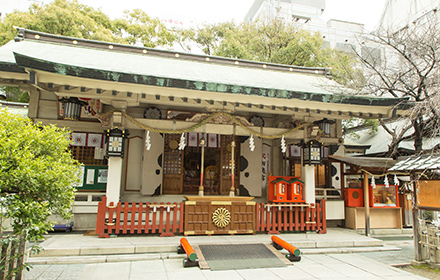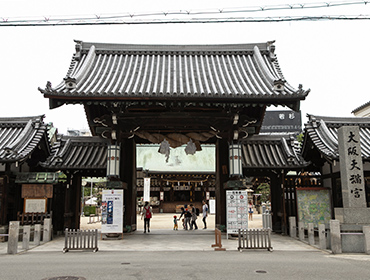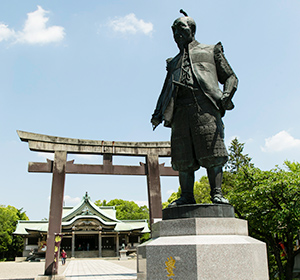SPECIAL
Discover OSAKA
You Can Go in December!
Hatsumode – Start the New Year with Osaka Metro

2025.12.12
The night of Near Year’s eve into the morning of the New Year’s Day is a special time around the world. In Japan, the first sunrise on January 1st is called “Hatsu Hinode” and many people make a special trip to go see the first sunrise and visit shrines. The beginning of the new year is a day to refresh the frame of our minds.
※Osaka Metro will operate on weekend/holiday schedule on December 27th and January 4th. For details, please check the official website of Osaka Metro.
Hatsumode:
New Year’s Visit to A Shrine
In Japan, it is customary to visit a shrine to pray for a peaceful year when the new year arrives. This is called Hatsumode, literally meaning the first visit or first pilgrimage. Sumiyoshi Taisha is said to have the most Hatsumode visitors in Osaka and some 2 million people visit this famous shrine at the beginning of every year. While there’s no specific rule, typically many go for Hatsumode on January 1 or, if not, by the 3rd day of the new year.
Some shrines designate certain days and times for prayers—something to consider when deciding where to go.
Take Osaka Metro to Hatsumode☆
Where To?
Traditionally, people visited shrines in the neighborhood but, in recent times, more and more people go out farther to a shrine that offers blessings for the specific wish they have. Take a moment and think about your wish and goals for the year and find a shrine that fits your needs.
Here’re some spots in Osaka that are great for Hatsumode!
Tsuyunoten Shrine for Love-related Wishes
Tsuyunoten Shrine is located in the middle of Umeda, a mere 3-minute walk from Higashi-Umeda Station. In the tragic story of “Sonezaki Shinju”—the love suicides at Sonezaki—written by Chikamatsu Monzaemon for ningyo joruri (Japanese traditional puppet theater) during the Edo period (1603-1868), a couple pursues each other despite obstacles and decides to die together in Sonezaki where the shrine is located. The story is an example of true love, popular among women still today. The shrine is also known as “Ohatsu-tenjin,” taking the name of the heroin, Ohatsu.


Osaka Temmangu for Scholarship
A quick 2-minute walk from Minamimorimachi Station, Osaka Temmangu sits next to Tenjinbashisuji Shotengai, Japan’s longest shotengai shopping street. Affectionately called “Temma no Tenjin-san” (Tenjin-san of Temma) by the locals, Osaka Temmangu is known for its deity of scholarship and often visited by students preparing for school entrance exams. The shrine is also known for household safety and protection against evil and offers a variety of amulets and ema (small wooden plaques for prayers or wishes) to grant academic and non-academic wishes. On July 24th and 25th every year, Osaka Temmangu hosts the Tenjin Matsuri Festival, one of Japan’s three major festivals.


A Must See Summer Festival in Osaka: The Fantastical Tenjin Matsuriwith Mikoshi, Boats, and Fireworks
Hokoku Shrine for Career Success
Located within the Osaka Castle Park near Tanimachi 4-chome or Morinomiya Stations, Hokoku Shrine is dedicated to Toyotomi Hideyoshi, a famous general and politician who built the castle in the 16th century. Born a son of a peasant, Hideyoshi advanced his career serving multiple samurai clans in various capacity until he reached the top. Today, Hideyoshi is one of the most famous samurais, known for unifying the country. Taking after Hideyoshi’s legacy, this shrine is perfect for those with high ambitions and in search of new career. An amulet with a design of hyotan gourd, a trademark of Hideyoshi, is known for for career and financial success and popular at this shrine.


Sukunahikona Shrine for Good Health
Sukunahikona Shrine is located about 2-minute walk from Kitahama Station. Known amongst Osakans as the deity of health and medicine, Sukunahikona Shrine occupies a portion of a business district called Dosho-machi, which is filled with major pharmaceutical companies. The shrine offers prayers for pets, important members of many families, making it a great spot for Hatsumode with pets!

Steps of Worship
Once you know your destination, learn how to offer prayers at a shrine. By properly offering respects to deities, your prayer may be heard.

- Throw a small offering (coins/cash) into the offertory box with gratitude. If there’re bells (above the offertory box), ring them by shaking the thick rope after you give your offering.
- Face the alter and stand with your back straight.
- Bow deeply twice, with your hands lowered down to the knees. Ideally, your body is bent at the hip about 90 degrees. (Keep your upper body straight throughout as you bow.)
- Bring your hands together in front of your chest, pull your right hand in just a bit, and clap twice.
- Bring your right hand back in place and pray with your eyes closed.
- Repeat the bow from Step 3 before stepping down.
Be mindful and offer prayers respectfully following these procedures.
There’s no rule for how much the small offerings should be. If you look to Japanese superstition, a little play on words would tell you 5 yen (reads “go-en” in Japanese) brings you “goen,” a chance or luck, while 11 yen brings you good luck (11 yen can be read “ii en,” “ii” meaning good in Japanese). Similarly, Japanese 5-yen and 50-yen coins—which have a hole in the middle—give you a good “mitooshi,” a good outlook or prospect for your future.

Spots Introduced
Tsuyunoten Shrine
[Access] About 3 mins walk from Higashi-Umeda Station Exit No. 7 on the Tanimachi Line
About 5 mins walk from Umeda Station Exit No. 15 on the Midosuji Line
About 9 mins walk from Nishi-Umeda Station Exit No. 6 on the Yotsubashi Line
[Hours] 6:00-24:00
Osaka Temmangu Shrine
[Access] About 2 mins walk from Exit 4-A at Minamimorimachi Station.
[Hours] 9:00-17:00
Hokoku Shrine
[Access] About 12 mins walk from Exit 3-B at Morinomiya Station.
About 14 mins walk from Exit 1-B at Tanimachi 4-chome Station, about 15 mins walk from Exit 3 at Temmabashi Station.
[Hours] 社務所/9:00〜16:50
Sukunahikona Shrine
[Access] About 2 mins walk from Exit 6 at Kitahama Station.
About 6 mins walk from Exit 11 at Yodoyabashi Station.
[Hours] 8:00am - 5:00pm
Recommended Plans

Keep the Demons Out of Osaka!
February 3rd is Setsubun in Japan. The word setsubun literally means division of the seasons …
2026.01.23

Eat a Jumbo Sushi Roll
Setsubun 2026: A Japanese Tradition
Setsubun is one of Japan’s best-known seasonal festivals, celebrate each February on the day …
2026.01.23

2025 Count Down the Japanese Way—
The Temple Bell on New Year’s Eve in Osaka
Already, 2025 is coming to an end and the beginning of a new year is …
2025.12.26






